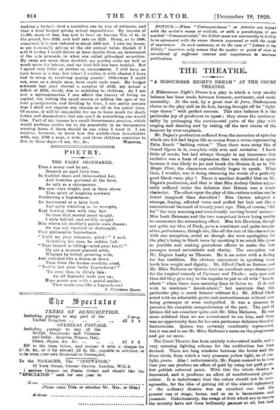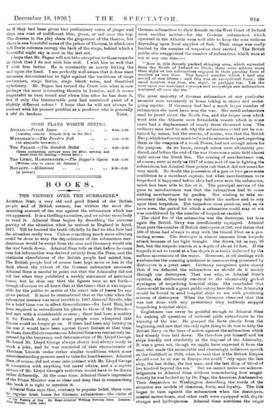THE THEATRE.
" A MIDSUMMER NIGHT'S DREAM " AT THE COURT THEATRE.
A Midsummer Night's Dream is a play in which a very careful balance has been made between humour, sentiment, and senti- mentality. At the end, by a great tour de force, Shakespeare shows us the play still on its feet, having brought off its " tight- rope dance " with perfect success. This nice balance it is the particular joy of producers to upset ; they stress the sentimen- tality by prolonging the sentimental Farts of the play with singing and dancing and by taking off the tart charm of the humour by over-emphasis.
Mr. Fagan's production suffered from the incursion of episodes which one felt had begun life as scenes from a revue representing Palm Beach " bathing entice." Then there were stray bits of Grand Opera in it, complete with aria and recitative. I know little of music, but had always thought in my innocence that recitative was a form of expression that was tolerated in opera because it was likely to jar and break the illusion if, as in The Magic Flute, the characters suddenly began to speak. What then, I wonder, was it doing obscuring the words of a perfectly good blank-verse play ? There is another dreadful blot on Mr, Fagan's production, and that is that Miss Audrey Carton apFar- ently suffered under the, delusion that Helena was a comic character. The effect upon the play of this curious notion can be better imagined than described Miss Carten adopted a strange, lisping, affected voice and puffed her hair out like a conventional barmaid of twenty years ago. This, of course," did for " the very amusing and occasionally moving lovers' scones— Miss Leah Bateman and the two competent lovers being unable to counteract the astonishing effect. Miss Iris Hawkins, though not quite my idea of Puck, gave a consistent and quite imagin- ative performance, though she, like all the rest of the characters, with one exception, acted as though she were apologising for the play's being in blank verse by speaking it as much like prose as possible and making gratuitous efforts to make the best passages sound naturalistic and chatty. The exception was Mr. Eugene Leahy as Theseus. He is an actor with a feeling for fine tradition. His obvious enjoyment in speaking verse lends him weight and dignity. Mr. Alfred Clark as Bottom and Mr. Miles Malleson as Quince lead an excellent corps dramutione for the tragical comedy of Pyramus and Thisbe; only now and then did they give way to the impulse to put us off with " knock- about" when there were amusing lines to listen to. (I do not wish to condemn " knock-about," but maintain that this particular play is much funnier without it) Mr. Alfred Clark acted with en admirable gusto and sententiousness without ever being grotesque or even undignified. It was a pleasure to perceive his complete comprehension of the part. The part of Quince did not somehow quite suit Mr. Miles Malleson. He was more subdued than we are accustomed to see him, and there was no opportunity here for his own particular delicious brand a fantasticism. Quince was certainly excellently represented, but it was sad to see Mr. Miles Malleson's name on the programme and get no more.
The Court Theatre has been entirely redecorated inside, and a very amusing lighting scheme for the auditorium has been devised. There are long windows between the boxes and the dress circle, from which a very pleasant yellow light, as of sun- light, pours. Alas ! unfortunately, Mr. Fagan seemed to beieve that you can produce an effect of gold by using not gold paint, but golclish coloured paint. With this the whole theatre is decorated, and it produces an effect of unadulterated ginger colour. It is unfortunate that the colour should not be more agreeable, for the idea of getting rid of the absurd upholstery o' the ordinary theatre was an excellent ono. and the general one of stage, boxes, and so on is harmonious and pleasant. Unfortunately, the swags of fruit which are to nineve the severity have not been brilliantly painted at all, but look
as if they had been given two preliminary coats of ginger and then one coat of indifferent blue, green, or red over the top. The dresses in the play share the gingerness of the theatre, but there is one beautiful scene of the palace of Theseus, in which two tall Doris columns occupy the back of the stage, behind which a beautiful night sky is seen in the last act.
hope that Mr. Fagan will not take exception to these remarks or think that I do not wish him well. I wish him so well that I wish him better. He is constantly so nearly hitting the nail upon the head. I am perfectly well aware that it does want immense determination to fight against the traditions of stage costumiers, stage fairies, stage blank verse, and theatrical upholstery. Mr. Fagan has turned the Court into what is now perhaps the most interesting theatre in London, and it seems ungrateful to turn round and abuse him after he has done it, but if only the innumerable pots had contained paint of a slightly different colour ! I hope that he will not always be content with his present position as a producer who is generally







































 Previous page
Previous page